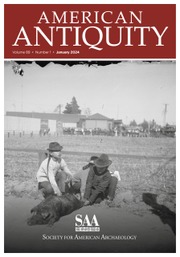Article contents
Comments on a Site in the St. Marks National Wildlife Refuge, Wakulla County, Florida
Published online by Cambridge University Press: 25 January 2017
Extract
In a recent issue of American Antiquity John M. Goggin has described certain materials from a site in the St. Marks National Wildlife Refuge, Wakulla County, Florida. The present note is a continuation of Goggin's remarks, based on certain materials not available to him at the time of his writing, and on a more recent surface collection of sherds from the site.
Goggin mentions a copper plate ornamented by incision, having human and animal figures depicted on the surface, which he had not seen. When this object was originally found in 1938 by Bill Kary of Tallahassee, it was examined by J. Clarence Simpson of the Florida Geological Survey. Simpson made a cast of the object, as well as a detailed drawing. The drawing reproduced in this note (Fig. 41, b) was made from Simpson's sketch and a copy of the cast in the possession of Dr. Mark F. Boyd of Tallahassee. The writer is grateful to both of these gentlemen for the use of their material.
- Type
- Facts and Comments
- Information
- Copyright
- Copyright © The Society for American Archaeology 1947
References
1 Goggin, John M., “Manifestations of a South Florida Cult in Northwestern Florida,” Amemcan Antiquity, Vol. 12, pp. 273-6.CrossRefGoogle Scholar The site in question is numbered Wk 11 in the Florida Park Service Archaeological Survey.
2 The pottery types used in this note have been briefly described and figured by Willey and Woodbury. Willey, Gordon R. and Woodbury, R. B., “A Chronological Outline for the Northwest Florida Coast,” Amemcan Antiquity, Vol. 7, pp. 232-54, 1942.CrossRefGoogle Scholar
3 Since this note was written David O. True of Miami has found a manuscript of William W. Kary describing excavations at the site, which had been mislaid in his files. Mr. True turned this over to John M. Goggin, who forwarded it to me.
According to this manuscript, burials at the site were mostly extended, although some were flexed. The articles mentioned both in this note and in Goggin's were associated with burials. Among the pottery was a vessel which was apparently Ft. Walton Incised; check-stamped sherds were abundant. Aboriginal artifacts included “a beautiful polished ceremonial ax,” three polished stone discoidals, two polished stone pendants, one of quartz crystal, a large elbow Plpe with incised designs, shell objects, and finely made projectile points.
This manuscript seems to remove any doubts concerning the association of the metal objects and Ft. Walton material.
- 1
- Cited by


